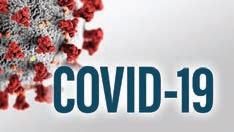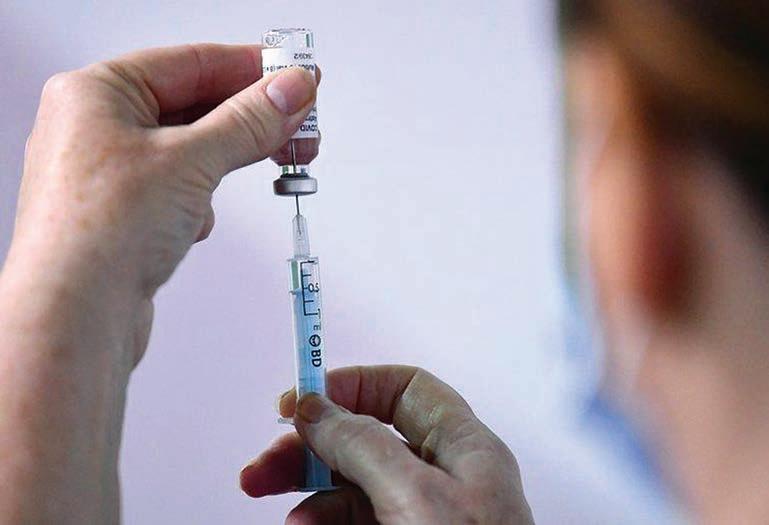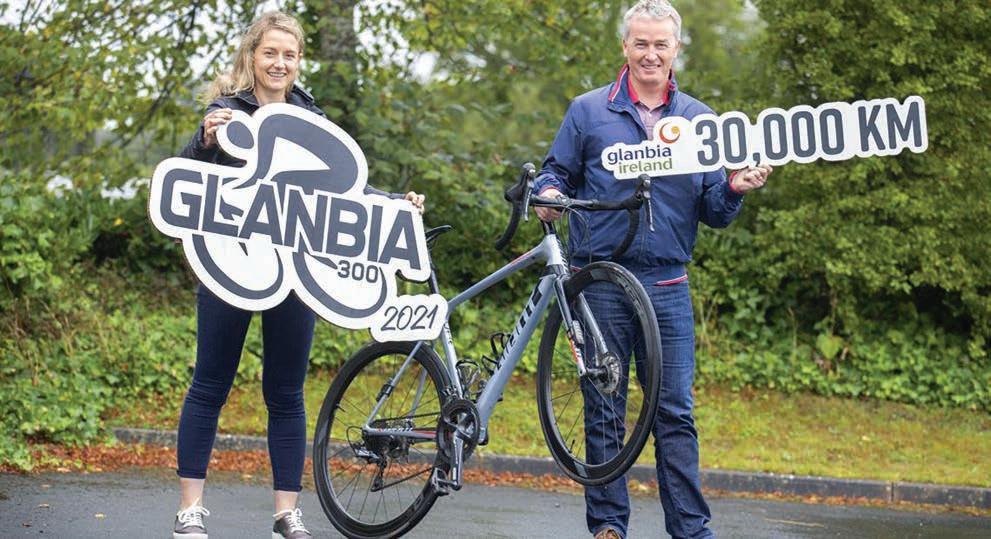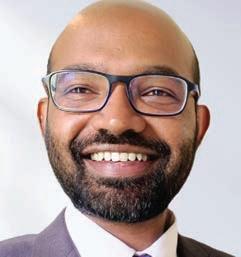
14 minute read
Covid Update
Delta not as good as other variants resisting antibodies, study shows
THE delta variant of the virus that causes Covid-19 is not particularly good at evading the antibodies that vaccination generates, according to a new study. e researchers analyzed a panel of antibodies generated by people in response to the P zer Covid-19 vaccine and found that delta was unable to evade all but one of the antibodies they tested. Other variants of concern, such as beta, avoided recognition and neutralization by several of the antibodies. e ndings in the latest edition of the journal Immunity help explain why vaccinated people have largely escaped the worst of the delta surge.
Advertisement
In previous studies, co-senior author Ali Ellebedy, an associate professor of pathology and immunology, of medicine, and of molecular microbiology at Washington University School of Medicine in St Louis, Missouri had shown that both natural infection and vaccination elicit lasting antibody production. But the length of the antibody response is only one aspect of protection. e breadth matters, too.
An ideal antibody response includes a diverse set of antibodies with the exibility to recognise many slightly different variants of the virus. Breadth confers resilience. Even if a few antibodies lose the ability to recognise a new variant, other antibodies in the arsenal should remain capable of neutralising it.
“ e fact that delta has outcompeted other variants does not mean that it’s more resistant to our antibodies compared to other variants,” says co-senior author Jacco Boon, an associate professor of medicine, of molecular microbiology, and of pathology and immunology.
“ e ability of a variant to spread is the sum of many factors. Resistance to antibodies is just one factor. Another one is how well the variant replicates. A variant that replicates better is likely to spread faster, independent of its ability to evade our immune response. So delta is surging, yes, but there’s no evidence that it is better at overcoming vaccine-induced immunity compared to other variants.”
To assess the breadth of the antibody response to SARSCoV-2, the virus that causes Covid-19, Ellebedy and colleagues — including authors Aaron Schmitz, a research specialist; Jackson S. Turner, an instructor in pathology & immunology; and Zhuoming Liu, a sta scientist — extracted antibodyproducing cells from three people who had received the P zer vaccine. ey grew the cells in the laboratory and obtained from them a set of 13 antibodies that target the original strain that began circulating last year.
e researchers tested the antibodies against four variants of concern: alpha, beta, gamma, and delta. Twelve of the 13 recognised alpha and delta, eight recognised all four variants, and one failed to recognise any of the four variants.
Scientists gauge an antibody’s usefulness by its ability to block virus from infecting and killing cells in a dish. So-called neutralising antibodies that prevent infection are thought to be more powerful than antibodies that recognise the virus but can’t block infection, although both neutralising and non-neutralising antibodies contribute to defending the body. e researchers found that ve of the 13 antibodies neutralized the original strain. When they tested the neutralizing antibodies against the new variants, all ve antibodies neutralized delta, three neutralized alpha and delta, and only one neutralized all four variants.
“In face of vaccination, delta is relatively a wimpy virus,” Ellebedy says. “If we had a variant that was more resistant like beta but spread as easily as delta, we’d be in more trouble.” e antibody that neutralized all four variants of concern—as well as three additional variants tested separately—was called 2C08. In animal experiments, 2C08 also protected hamsters from disease caused by every variant tested: the original variant, delta, and a mimic of beta.
Some people may have antibodies just as powerful as 2C08 protecting them against SARS-CoV-2 and its many variants, Ellebedy says. Using publicly available databases, the researchers discovered that about 20% of people infected or vaccinated against SARSCoV-2 create antibodies that recognize the same spot on the virus that is targeted by 2C08. Moreover, very few virus variants (.008%) carry mutations that allow them to escape antibodies targeting that spot.
“ is antibody is not unique to the person we got it from,” Ellebedy says. “Multiple antibodies targeting this area have been described in the literature; at least one is under development as a COVID-19 therapy.”

Yet more good news on jabs and antibodies
IN a new video on his YouTube channel, world pulmonary medicine and critical care specialist Mike Hansen explains all of the di erent factors which affect how vulnerable an individual might be against the Delta variant of Covid-19.
Dr Hansen (pictured) begins by stating that if you have not had the vaccine and have not previously had Covid, then you currently have zero protection, and that your odds of contracting the Delta variant are looking “bleaker and bleaker, depending on what underlying risk factors you may have”.
However, if you have not yet been vaccinated but did previously have Covid, then it is possible that you will have some level of protection against the virus for about a year. ere have also been studies which have found that for those who’ve had Covid-19, mRNA vaccination boosts the memory antibodies that develop after infection, causing there to be a more robust immune response. “ is is called hybrid immunity,” Dr Hansen explains. “Part of the immunity comes from the immune system from previous Covid infection, and the other from the vaccine.”
Additionally, there is strong evidence that recovered patients who have received a single dose of the AstraZeneca, PQzer, or Moderna vaccines had a huge increase in protective antibodies against the Delta, Beta, and Alpha variants. “ e big takeaway here is that vaccinating people who had previous COVID will likely give them much higher protection against delta and other variants,” says Dr Hansen.
As for people who have been vaccinated but have not previously had Covid infection, they have been found to have high levels of neutralising antibodies against the Delta variant 8 to 16 weeks after receiving the second dose.
Dr Hansen also cites a study (yet to be peer reviewed) which determined the PQzer vaccine’s e ectiveness against Delta as being around 84 percent, making a booster shot a sensible precaution.

Croke Park melee ‘indefensible’
LARGE gatherings of crowds before and after the All-Ireland hurling nal were “indefensible,” Minister for Foreign A airs Simon Coveney has said. Crowds of people socialising on the streets around Croke Park, with little social distancing and few people wearing face masks, “wasn’t how it was supposed to work,” he said. Some 40,000 spectators were permitted into Croke Park for the game on Sunday, where Limerick beat Cork 3-32 to 1-22. Large crowds gathered to socialise and drink along the streets near the stadium before and after the game, with videos circulated widely on social media showing a lack of social distancing and few people wearing masks. Gardai have said it is investigating alleged breaches of Covid-19 regulations at one licensed premises in the area near the stadium. Gardaí also instructed several pubs to temporarily close on match day, due to the large crowds. e scenes were heavily criticised by arts and live entertainment industry groups, who said they highlighted how current strict limits on numbers at music and other live cultural events were unfair. A decision from the Government on the latter issue is expected in the next few days. But the thinking is that current restrictions will stay much the same for at least six weeks.
PUP cuts ‘must be halted now’
TD Kathleen Funchion has demanded that the Government immediately halt iwhat she says are “incoherent and ill-timed plans’ to cut the Pandemic Unemployment Payment (PUP).
The cuts are due to begin on September 7, despite some sectors still being closed due to public health advice.
The Sinn Fein TDsaid: “The pandemic is not over. Some sectors, such as the live entertainment industry, remain closed due to public health advice. Despite this, the government is insisting on ploughing ahead with unfair cuts to the PUP in just over a fortnight.
“The cuts to the PUP and the plan to transition people from the PUP to Jobseekers on September 7 must be scrapped.
“These cuts are punishing people who cannot return to work and will hit young workers hardest, she said.
“They are a slap in the face for those in the live music and entertainment sector who again this week have failed to get any clarity from the Government about when they can reopen.
“These cuts will see many workers currently on the PUP rate of €203 being moved to Jobseeker payments. This will affect up to 29,000 people over the coming weeks. These workers are not jobseekers, they are merely being prevented from returning to their jobs due to public health restrictions.
“Young people su ering the brunt of the government’s failure on housing and rents will be worst hit by this move with those under the age of 25 on the lowest rate of the PUP being transitioned to the reduced Jobseekers rate of €112.70 a week from 14th September 14,” the TD said.
“Young people living at home will be particularly impacted.
“The Government cannot continue with these unfair and short-sighted cuts which will plunge thousands of workers into financial uncertainty,” she said.
New chapter as readers’ mobile library is coming back
KILKENNY County Council Library Service will resume its full Mobile Library service from September 7. The mobile serves a variety of stops from village-based community stops, schools, creches, Early Learning Centres and nursing homes – more 60 stops across the County.The new schedule from September will maintain the existing stops where users can select their own items but will also incorporate the popular door to door service for over 65s that are unable to visit their local library. Schools and creches on the routes can either access the service on the mobile vehicle or have pre-selected collections dropped off to them.“Covid-19 restrictions meant we had to adapt our services to our users by developing new ways to serve our readers, and unfortunately the service to rural locations was suspended early last year. In 2020 we developed a new county-wide doordoor delivery service for over 65’s, as well as dropping off collections of books directly to schools and creches,” said Declan Macauley, Executive Librarian. “Next year will mark the 50th Anniversary of Kilkenny County Council’s Mobile Library Service, so it is especially heartening to be going back out on the road in September to reconnect with our users and offer the browsing experience,” said Mr Macauley. “We are so looking forward to getting back on the road, and meeting up with our users, old and new,”said Caitriona Kenneally, Senior Library Assistant, Mobile Service. “We kept in touch with our members throughout the lockdowns, and know that we were greatly missed, reaction to our return has been heartwarming.”All public health guidelines will be adhered to as part of this service.
Details of our schedules and stops will be available soon on the library website, www.kilkennylibrary.ie.
Kilkenny’s crafts folk get world thumbs up
KILKENNY has been granted Craft City and Region status by the World Crafts Council, just the fourth place in Europe to be so designated since the scheme started a number of years ago. Local crafts people are hoping the prestigious accolade will lead to the county becoming an even more popular destination for visitors and craft workers.
The application was prepared by the Made in Kilkenny craft collective before being presided upon by judges from the European branch of the world craft body.
Finally, word came through that Kilkenny had been successful.
“It’s a wonderful, wonderful designation,” Made in Kilkenny chairperson Catherine Conroy told RTÉ News. “We’re so honoured to achieve this.”
Made in Kilkenny was founded in 2009 by a group of craftspeople in the Kilkenny who came together to support each other and also to promote the area as a craft hotspot.
The application for international recognition was supported by Kilkenny County Council and also by Minister of State Malcolm Noonan, a local Green Party TD, and the Crafts Council of Ireland.
“It’s going to put Kilkenny on the international stage, the specialness of Kilkenny,” Catherine Conroy said, “because there are so many craftspeople here, not just among ourselves.
“There are 30 in our group but there’s many others and the quality is exceptional and it’s just going to spread it far and wide.”
She pointed out that there’s a “long tradition of craft” in Kilkenny and the new award will bolster that reputation.
Gus Mabelson, who also worked on the World Crafts Council application, told RTE that all involved were “delighted” with the success.
“We decided to apply and we heard this year we were successful,” he said. “We’re the fourth [in Europe] to get that accolade. There’s one in Denmark, one in England and one in Scotland.”
The award is a “great credit” to all involved in craft in Kilkenny, he added.
Members of Made in Kilkenny range across people working in weaving, pottery, ceramics, jewellery and wood-turning.
Christopher Hetzel of the Rudolph Hetzel jewellery shop on Patrick Street in the city said the designation was an appropriate recognition for Kilkenny’s strength as a craft hub.
“We’ve been around for over 50 years,” he said of the family business which he now runs, operating the techniques in goldsmithing and silversmithing that have been used by experts for centuries.
“Kilkenny has a great craft scene. The Kilkenny Design Workshops in the 1960s really helped to kickstart that and they trained locals as well as attracting people from other places and now we have fantastic crafts.”
Meanwhile, its back to crafts business at hand... WORKERS at one of Kilkenny’s biggest employers are walking, running, cycling, and swimming their way to 30,000km to raise funds for charity.
Glanbia Ireland employees, their families and friends are getting on their bikes, they’re lacing up their walking and running shoes and grabbing their swimming gear in an effort to raise €40,000.
They hope to surpass a combined 30,000 km goal in the space of a just a week with the funds raised going to Breast Cancer Ireland, The Samaritans and suicide awareness charity – Teac Tom in Kilkenny.
The Glanbia 300 takes place from September 6 to 12.
Since it began seven years ago has raised almost €240,000 for multiple charities.
Project sponsor Jim O’Neill said: “Two groups that will contribute a huge number of kilometres to the grand total are our 100k and 150k cyclists who will leave Glanbia House on the morning of Friday, September 10, for a competitive tour of South Kilkenny and parts of Tipperary.
“Starting from Kilkenny, riders will head south into Tipperary towards the foothills of Slievenamon where the 100K group will split, heading for Carrick on Suir and on towards Granagh, where it’s a sharp turn for the long 45k stretch home.
“Once separated, the 150K group will continue towards the outskirts of Clonmel before a hairpin turn sees them straddle the Waterford border to Carrick and back on the main route through Granagh, Mullinavat and Ballyhale.
“Hitting our Kilometre target will not be possible without the help of all Glanbia Ireland employees.
“We’re asking each of our employees, along with their families and friends, to commit to a minimum 15K challenge from September 6th to 12th,” Mr O’Neill said.

Trains, planes and automobiles.... well not quite, but it’s some trip for charity
Top eye specialist appointed at Aut Even hospital
THE hospital group UPMC have announced the appointment of Consultant Ophthalmologist, Mr Pathma Ramasamy (pictured), a specialist in retinal surgery including routine and complex cataract surgery.
His appointment further strengthens UPMC’s expertise in this area and expands ophthalmology services available to patients in Kilkenny and across the South East so they can be treated closer to home. Mr Ramasamy will be based in Kilkenny’s Aut Even Hospital. training in the Royal Victoria Eye and Ear Hospital Dublin, Cork University Hospital, University Hospital Limerick, and University Hospital Waterford. In 2015, Mr Ramasamy was awarded his doctorate from the Royal College of Surgeons in Ireland and won multiple national and international awards for his research into metastatic ocular melanoma. He completed his subspecialty training in medical and surgical retina in Bristol Eye Hospital and was a recipient of the Irish College of Ophthalmologists/Bayer Clinical Fellowship Award for undertaking this work.
Mr Ramasamy has also worked as a Consultant Ophthalmic Surgeon in the Royal Victoria Eye and Ear Hospital Dublin and in University Hospital Waterford.
He is in the specialist division of the Irish Medical Council, Fellow of the Royal College of Surgeons Ireland and Fellow of the European Board of Ophthalmology. Mr Ramasamy is also a member of the Irish College of Ophthalmologists.









